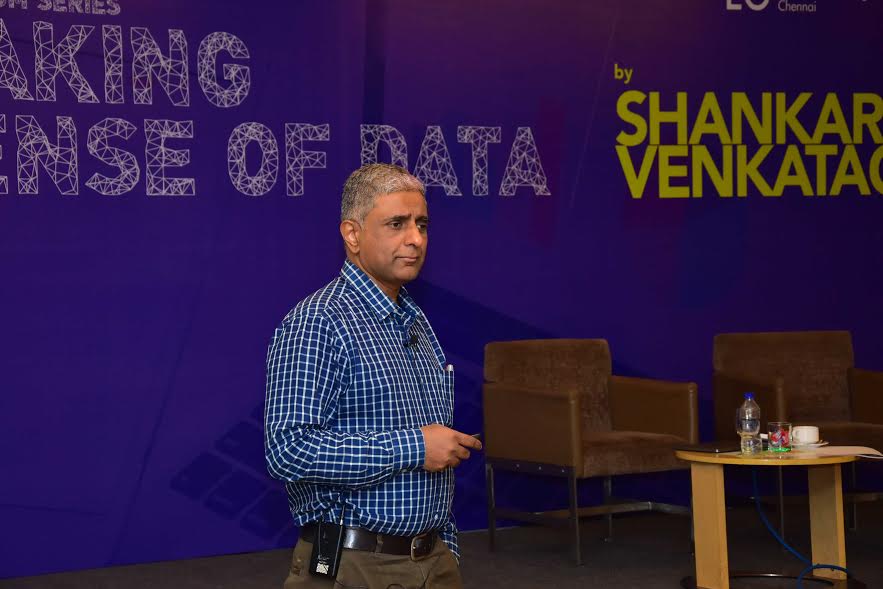Entrepreneurship entails taking all functions of the enterprise into one’s own hands. One key function is to analyze the data that is collected by various business activities. Entrepreneurs Organization, Chennai, an Association of Entrepreneurs found in 2000 dedicated to fostering the growth of Entrepreneurs across the City comprising 79 members represented from various industries. This chapter has been currently presided by Vinod Krishnan, (MD, TVS NEXT). This workshop was conducted by Entrepreneurs Organization, Chennai, an Association of Entrepreneurs found in 2000 dedicated to fostering the growth of Entrepreneurs across the City comprising 79 members represented from various industries. This chapter has been currently presided by Vinod Krishnan, (MD, TVS NEXT) that intended to address the basics of data analysis.
Entrepreneurs Organization, Chennai recently organized a full day learning event – CLASSROOM SERIES: MAKING SENSE OF DATA at Rain Tree, Anna Salai, Chennai on the 25th March’2017 by Dr. Shankar, Decision Sciences & Information Systems, IIM Bangalore with whom We had a great interview with. We also had a wonderful time attending this interesting and brilliant session on Data Analytics as Entrepreneurship entails taking all functions of the enterprise into one’s own hands. One key function is to analyze the data that is collected by various business activities. The workshop addressed the basics of data analysis. It employs a hands-on approach, so that participants are able to pull up data on a spreadsheet and begin to derive business sense. Insights from such investigations can be plowed back into the firm’s operations, with lasting benefits. Some key points of discussion are as below:
· Retail data analysis using spreadsheet
· Understanding the distributions of variable
· Probabilistic decision-making
· Random sampling and statistical inference
· Forecasting
Here is the interview we had with him.
1. What is Business data?
>> Business processes generate huge volumes of data. For example, retail operations capture transactional details, and store them in databases. Marketing campaigns are nowadays conducted on social media, and the responses/retweets to messages contribute to business intelligence
2. How Important is to Analyze Business data and at what stage is it most important?
>> Business data can be analyzed to make decisions on diverse fronts as inventory management, fraud detection, forecasting and so on. Models can be drawn up at every stage, based on historical information.
3. How would you describe the Current scenario of data analytics in India vis-à-vis the rest of the world and its future?
>> Data analytics has come of age in this era of cloud computing, where storing and processing volumes of data can be carried out without having to invest in infrastructure. India lags countries like the US and UK in adopting a comprehensive approach to this field. Not only corporate information is captured in a scattered manner, government agencies have a long way ahead in organizing all the data it has into a form that is amenable for further processing.
How does one use data gathering or analysis for different industries.
4. How does one choose variables to gather data and how is it done for different industries?
>> Variable choices are driven by the questions one sets out to answer. These questions are motivated by the business context.
There are a plethora of techniques and tools to analyze data collected by different industries. They fall under the broad categories of predictive/prescriptive analytics.
5. There’s a lot of invasion of privacy these days when it comes to gathering business data, how ethical is this? How far can an organization go to collect data? Is invasion of privacy okay? What does it mean for the future?
>> Invasion of privacy is never okay. In the past, large outfits such as Google and Facebook have been in the news for unlawful collection of data, and default settings that are borderline unethical. It is almost impossible to maintain personal privacy these days, given the abundant occasions on which seemingly secure platforms have been hacked. The future looks quite bleak in this aspect.
Profile of the Shankar Venkatagiri
Shankar Venkatagiri is a faculty member in the Quantitative Methods & Information Systems area at the Indian Institute of Management Bangalore. He is a mathematician and a computer scientist by training, and has worked in IT consulting around Boston, prior to pursuing an academic career. Shankar has taught courses in statistics to students at the graduate and doctoral levels at IIM Bangalore. He frequently interacts with industry in various capacities. Shankar’s interests lie in analytics and cloud computing.

